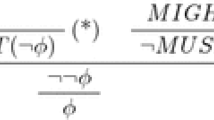Abstract
The subject of this article is Modal-Epistemic Arithmetic (MEA), a theory introduced by Horsten to interpret Epistemic Arithmetic (EA), which in turn was introduced by Shapiro to interpret Heyting Arithmetic. I will show how to interpret MEA in EA such that one can prove that the interpretation of EA is MEA is faithful. Moreover, I will show that one can get rid of a particular Platonist assumption. Then I will discuss models for MEA in light of the problems of logical omniscience and logical competence. Awareness models, impossible worlds models and syntactical models have been introduced to deal with the first problem. Certain conditions on the accessibility relations are needed to deal with the second problem. I go on to argue that those models are subject to the problem of quantifying in, for which I will provide a solution.
Similar content being viewed by others
References
Boolos G. S., Burgess J. P., Jeffrey R. C.: Computability and logic (4th ed.). Cambridge University Press, New York (2003)
Fagin R., Halpern J. Y.: Belief, awareness, and limited reasoning. Artificial Intelligence 34, 39–76 (1988)
Fagin R., Halpern J. Y., Moses Y., Vardi M. Y.: Reasoning about knowledge. MIT Press, Cambridge, MA (1995)
Flagg R., Friedman H.: Epistemic and intuitionistic formal systems. Annals of Pure and Applied Logic 51, 387–392 (1986)
Goodman N. D.: Epistemic arithmetic is a conservative extension of intuitionistic arithmetic. The Journal of Symbolic Logic 49(1), 192–203 (1984)
Horsten, L. (1993). Epistemic and modal-epistemic arithmetic. Ph.D. Thesis, Katholieke Universiteit Leuven.
Horsten L.: Modal-epistemic variants of Shapiro’s system of epistemic arithmetic. Notre Dame Journal of Formal Logic 35(2), 284–291 (1994)
Horsten L.: In defense of epistemic arithmetic. Synthese 116(1), 1–25 (1998)
Hughes G. E., Cresswell M. J.: A new introduction to modal logic. Routledge, London (1996)
Leitgeb H.: On formal and informal provability. In: Linnebo, O., Bueno, O. (Eds.), New waves in philosophy of mathematics, Palgrave Macmillan, New York (2009)
Rantala V.: Impossible worlds semantics and logical omniscience. Acta Philosophica Fennica 35, 106–115 (1982)
Shapiro S.: Epistemic and intuitionistic arithmetic. In: Shapiro, S. (Ed.), Intensional mathematics, studies in logic and the foundation of mathematics (Vol. 113, pp. 11–43) . North-Holland, Amsterdam (1985)
Sillari G.: Quantified logic of awareness and impossible possible worlds. Review of Symbolic Logic 1(4), 514–529 (2008)
Smoryński C. A.: Review of S. Shapiro, “Intensional Mathematics”. Journal of Symbolic Logic 56(4), 1496–1499 (1991)
Spicer F.: Are there any conceptual truths about knowledge?. Proceedings of the Aristotelian Society 108(1), 43–60 (2008)
Williamson T.: Knowledge and its limits. Oxford University Press, New York (2000)
Williamson T.: The philosophy of philosophy. Wiley-Blackwell, Oxford (2008)
Author information
Authors and Affiliations
Corresponding author
Rights and permissions
About this article
Cite this article
Heylen, J. Modal-Epistemic Arithmetic and the problem of quantifying in. Synthese 190, 89–111 (2013). https://doi.org/10.1007/s11229-012-0154-3
Received:
Accepted:
Published:
Issue Date:
DOI: https://doi.org/10.1007/s11229-012-0154-3




